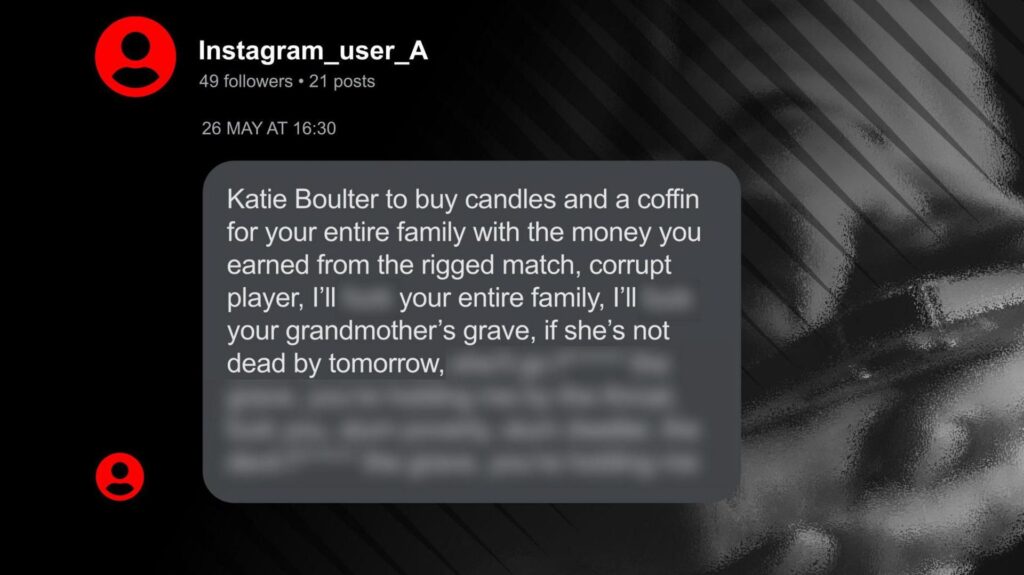Katie Boulter, a professional tennis player from Great Britain, has recently spoken out regarding the alarming levels of online abuse she has faced, particularly amidst her participation in high-stakes events such as the French Open. After a match marked by intense pressure and public scrutiny, Boulter found herself confronting not just the usual competitiveness of the sport, but also a barrage of threatening messages via social media. The abuse commenced immediately following a tie-break loss in her match, where one particularly disturbing message read, “Hope you get cancer,” while another suggested horrific violence against her family.
The distressing nature of Boulter’s revelations underscores a disturbing trend in professional sports, where social media can amplify negative interactions. Boulter, ranked 39th in the world, agreed to share her experiences with BBC Sport to shed light on the volume and severity of the abuse players receive. She noted that abusive messages have become a norm for many athletes, leading her to worry about the psychological impact it may have on younger players entering the professional arena. Boulter reflects on her beginnings, when she used to internalize criticisms about her appearance, and she laments how social media seems to be fostering a hostile environment.
In the specific incident discussed, the messages Boulter received shifted from hateful language to direct threats against her loved ones during a match against Carole Monnet on May 29. Although she triumphed in that match with a score of 6-7 (4-7) 6-1 6-1, the emotional toll of reading such messages was undeniable. Boulter expressed her struggle to distinguish between harmless criticisms and legitimate threats, stating that the anonymity of online interactions makes players feel vulnerable and fearful of their safety.
The British number two’s analysis suggests that a significant portion of the abuse is linked to betting activity on matches, with many messages following both wins and losses. Notably, Boulter has learned to cope better over time by either ignoring these messages or refraining from checking them altogether. However, the statistics provided to the BBC highlight a troubling picture: about 8,000 instances of abusive, violent, or threatening messages were recorded in 2024 targeting 458 tennis players.
As the numbers indicate, a significant share of this abuse often originates from frustrated gamblers, revealing a correlation between betting odds and the vitriol directed at players. Efforts are being made to combat this disturbing trend; organizations like the International Tennis Federation (ITF) and Women’s Tennis Association (WTA) have collaborated with data science firms to address this issue. An artificial intelligence system called Threat Matrix assists in detecting harmful messages, shedding light on the scope of abuse players contend with.
Additionally, Boulter made it clear that explicit images sent to players represent another serious concern, especially for younger athletes. She noted that she sometimes encounters graphic content in hidden messages, emphasizing that this is a pervasive issue that warrants more attention. Boulter attempts to engage with her abusers sometimes, hoping to make them reflect on their words, which at times has led to apologies.
Looking forward, Boulter anticipates the onslaught of abuse will intensify as she competes at Wimbledon, her home Grand Slam. Given that her fiancée, Alex de Minaur, also faces similar scrutiny for his performances, the couple is often subjected to compounded hostility from fans linked to both players’ successes and failures. They receive a deluge of messages, underscoring the relentless nature of online interactions in professional sports.
Wider conversations are emerging around the need for sports organizations and betting companies to collaborate effectively on mitigating online abuse. Various tennis players, including Iga Swiatek and Jessica Pegula, have echoed concerns about the regularity of threats, advocating for action to protect athletes’ well-being.
While there are ongoing initiatives to protect players, including the implementation of reporting systems and educational outreach, the depth of the problem remains significant. The voices of athletes like Boulter, who expose their experiences, are crucial to fostering necessary conversations about mental health, emotional safety, and the urgent need to reform the online environment surrounding professional sports.



